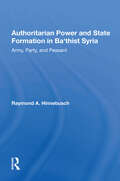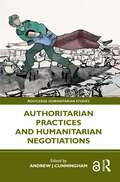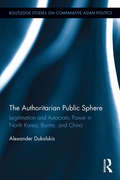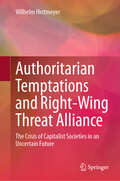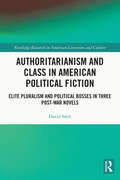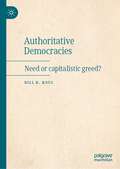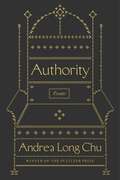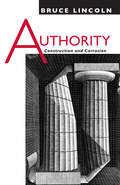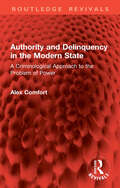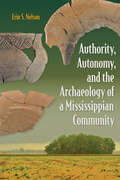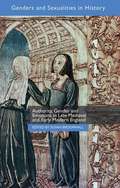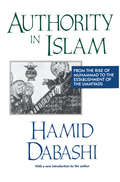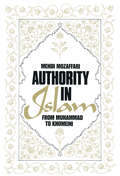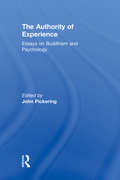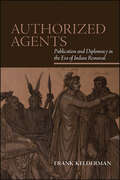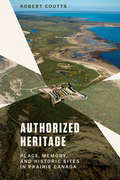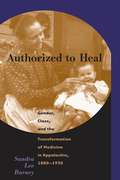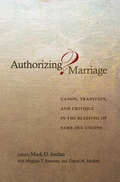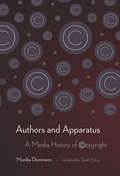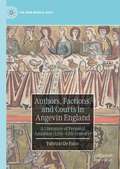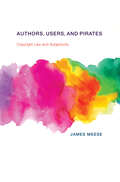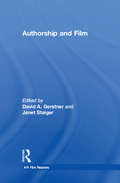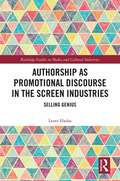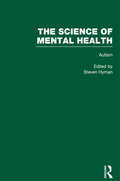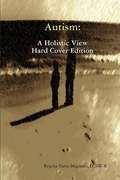- Table View
- List View
Authoritarian Power And State Formation In Ba`thist Syria: Army, Party, And Peasant
by Raymond A HinnebuschThe social and economic forces that worked together to bring the Ba'thist party to power in 1963: the failure of traditional and liberal leadership, an agrarian crisis, the development of party ideology, the politicization of the army and rural mobilization - are examined in this study. Dr Hinnebusch aims to show how the Ba'th's road to power shaped its ideology and the character of its rule. Attention is then given to the pillars of state power - the army, political organizations and the peasantry. The author concludes that the regime has pursued a dual strategy for maintaining power - placing kin and clientelist networks at the levers of coercive power and building structures based on the mass incorporation of the rural population.
Authoritarian Practices and Humanitarian Negotiations (Routledge Humanitarian Studies)
by Andrew J CunninghamThis book examines authoritarian practices in relation to humanitarian negotiations. Utilising a wide variety of perspectives and examining a range of contexts, the book considers how humanitarians assess and engage with authoritarian practices and negotiate access to populations in danger.Chapters provide insights at the macro, meso, and micro levels through case studies on the international and domestic legal and political framing of humanitarian contexts (Xinjiang, Afghanistan, Venezuela, Russia, and Syria), as well as the actual practice of negotiating with authoritarian regimes (Ethiopia). A theoretical grounding is provided through chapters elaborating on the ethics and trust-building dimensions of humanitarian negotiations, and an overview chapter provides a theoretical framework through which to analyse humanitarian negotiations against the backdrop of different types of authoritarian practices.This book provides a wide-ranging view which broadens the frame of reference when considering how humanitarians view and engage with authoritarian practices. The objective is to both put these contexts into conceptual order and provide a firm theoretical basis for understanding the politics of humanitarian negotiations in such difficult contexts. This book is useful for those studying international politics and humanitarian studies, as well as for practitioners seeking to better systematise their humanitarian negotiations.
The Authoritarian Public Sphere: Legitimation and Autocratic Power in North Korea, Burma, and China (Routledge Studies on Comparative Asian Politics)
by Alexander DukalskisAuthoritarian regimes craft and disseminate reasons, stories, and explanations for why they are entitled to rule. To shield those legitimating messages from criticism, authoritarian regimes also censor information that they find threatening. While committed opponents of the regime may be violently repressed, this book is about how the authoritarian state keeps the majority of its people quiescent by manipulating the ways in which they talk and think about political processes, the authorities, and political alternatives. Using North Korea, Burma (Myanmar) and China as case studies, this book explains how the authoritarian public sphere shapes political discourse in each context. It also examines three domains of potential subversion of legitimating messages: the shadow markets of North Korea, networks of independent journalists in Burma, and the online sphere in China. In addition to making a theoretical contribution to the study of authoritarianism, the book draws upon unique empirical data from fieldwork conducted in the region, including interviews with North Korean defectors in South Korea, Burmese exiles in Thailand, and Burmese in Myanmar who stayed in the country during the military government. When analyzed alongside state-produced media, speeches, and legislation, the material provides a rich understanding of how autocratic legitimation influences everyday discussions about politics in the authoritarian public sphere. Explaining how autocracies manipulate the ways in which their citizens talk and think about politics, this book will be of interest to students and scholars of Asian politics, comparative politics and authoritarian regimes.
Authoritarian Temptations and Right-Wing Threat Alliance: The Crisis of Capitalistic Societies in an Uncertain Future
by Wilhelm HeitmeyerThis book, by noted German sociologist Wilhelm Heitmeyer, analyses capitalist development in Western Europe, with a focus on Germany, since the 1990s and its consequences for open society and liberal democracy. Following Heitmeyer’s long-term interest in extremism, this book highlights two main threads of discussion: the causes and distribution of authoritarian tendencies, and the processes and steps of escalation of these tendencies through right-wing alliances. It critically views capitalism and capitalist governance in times of crises against problems of political representation and the devaluation of certain groups. It looks at a broad spectrum of attitudes in the population on the bases of a representative longitudinal study called ‘group-focused enmity’. Using the model of a ‘concentric escalation continuum’, this book also analyses the steps of differentiation and dynamization of the right-wing spectrum in the process of development of successful right-wing alliances. Heitmeyer meticulously studies how violent processes escalate and increases as a danger for the open society and liberal democracy, especially in times of crisis and unsecured future. The book has important gleanings for anyone seeking to understand and address extremism and political alienation in societies today.
Authoritarianism and Class in American Political Fiction: Elite Pluralism and Political Bosses in Three Post-War Novels (Routledge Research in American Literature and Culture)
by David SmitThis book analyzes what many critics consider to be the three best examples of modern American political fiction—Robert Penn Warren’s All the King’s Men, Edwin O’Connor’s The Last Hurrah, and Billy Lee Brammer’s The Gay Place—to address a specific problem in American governance: how the intense competition for power among elite factions often results in their ignoring major groups of their constituents, thereby providing political bosses with a rationale to seize authoritarian control of the government in the name of constituent groups who feel ignored or neglected, promising them more democratic rule, but in the process, excluding other groups, so that the bosses themselves become elitist, ruling only for the sake of some constituents and not others.
Authoritative Democracies: Need or capitalistic greed?
by Bill K. KoulThis book comments on growing authoritarianism in democracy and suggests how it ought to be instead. It asks if some degree of authoritarianism is the need of the hour to address potentially existential issues facing the human race. Readers are encouraged to analyse the state of democracy in their own countries and verify if it meets their expectations, or if it is just a myth or an imposter, or a necessary but imperfect compulsion in the absence of a perfect alternative. The book presents a commentary on the state of democracy in some of the world’s leading democracies. It aims to challenge the human mind, which seems to be getting accustomed to not having to think, thanks to a constant bombardment of information—real and fake and in-between—that it receives through social and print media, which is freely accessible through smartphone to which it has become addicted. It discusses how the drivers of capitalism – through their business-like connections with powerful and influential politicians and celebrities—could be cleverly manipulating the gullible human mind and exploiting the system to their own material benefit.
Authority: Essays
by Andrea Long ChuMany worry that criticism is suffering from a crisis of authority. In a world where everyone’s a critic, what is criticism for? Since her canonical 2018 essay “On Liking Women,” the Pulitzer Prize–winning critic Andrea Long Chu has established herself as a leading public intellectual and a bold cartographer of the new landscape of taste itself. Authority brings together sharp, illuminating essays on everything from musical theater to sci-fi novels, as well as an acclaimed tetralogy of personal essays first published in the magazine n+1. Throughout, Chu defies the imperative to leave politics out of art, charging fellow critics like Maggie Nelson and Zadie Smith with complacent humanism and modeling how the left might brave the culture wars with both its faculty of judgment and its sense of justice intact.In two magisterial new essays, Chu offers a fresh intellectual history of criticism’s crisis of authority, tracing the surprisingly political contours of the discipline from its origins in the Enlightenment to our present age of social media. The desire to recover some lost authority, she argues, is neither new nor particularly freeing. Rather than being taken in by an endless cycle of trumped-up emergencies over the state of our culture, Authority makes a compelling case for how to do criticism in light of the actual crises, from climate change to rising authoritarianism, that confront us today.
Authority: Construction and Corrosion
by Bruce LincolnWhat is authority? How is it constituted? How ought one understand the subtle (and sometimes not-so-subtle) relations between authority and coercion? Between authorized and subversive speech? In this fascinating and intricate analysis, Bruce Lincoln argues that authority is not an entity but an effect. More precisely, it is an effect that depends for its power on the combination of the right speaker, the right speech, the right staging and props, the right time and place, and an audience historically and culturally conditioned to judge what is right in all these instances and to respond with trust, respect, and even reverence. Employing a vast array of examples drawn from classical antiquity, Scandinavian law, Cold War scholarship, and American presidential politics, Lincoln offers a telling analysis of the performance of authority, and subversions of it, from ancient times to the present. Using a small set of case studies that highlight critical moments in the construction of authority, he goes on to offer a general examination of "corrosive" discourses such as gossip, rumor, and curses; the problematic situation of women, who often are barred from the authorizing sphere; the role of religion in the construction of authority; the question of whether authority in the modern and postmodern world differs from its premodern counterpart; and a critique of Hannah Arendt's claims that authority has disappeared from political life in the modern world. He does not find a diminution of authority or a fundamental change in the conditions that produce it. Rather, Lincoln finds modern authority splintered, expanded, and, in fact, multiplied as the mechanisms for its construction become more complex—and more expensive.
Authority and Delinquency in the Modern State: A Criminological Approach to the Problem of Power (Routledge Revivals)
by Alex ComfortIn Authority and Delinquency in the Modern State, originally published in 1950, Alex Comfort discusses the relationship between crime and power, and traces the mechanisms which may lead to delinquent behaviour by those in office. In the early twentieth century, the literature of abnormal behaviour contained many hints of identity between the psychogenesis of crime and the psychogenesis of political power, and with the recognition of “war crimes”, and the possible criminality of governments, these hints had been brought into the open. His conclusions presented a serious challenge to the traditional conception of Democracy and of the State at the time. He discusses the forces in democratic society which tend to select potential delinquents as candidates for Parliament and for office, or which may operate to produce delinquency in those who obtain power.Dr Comfort, a Lecturer in Physiology at the London Hospital at the time of publication, obtained his psychological training in child welfare work, but was better known as a novelist and poet. This book was a contribution to the theoretical background of political anarchism which hoped to provoke serious and lively discussion among students of politics and of social psychology at the time.
Authority, Autonomy, and the Archaeology of a Mississippian Community (Florida Museum of Natural History: Ripley P. Bullen Series)
by Erin S. NelsonThis book is the first detailed investigation of the important archaeological site of Parchman Place in the Yazoo Basin, a defining area for understanding the Mississippian culture that spanned much of what is now the United States Southeast and Midwest before the mid-sixteenth century. Refining the widely accepted theory that this society was strongly hierarchical, Erin Nelson provides data that suggest communities navigated tensions between authority and autonomy in their placemaking and in their daily lives. Drawing on archaeological evidence from foodways, monumental and domestic architecture, and the organization of communal space at the site, Nelson argues that Mississippian people negotiated contradictory ideas about what it meant to belong to a community. For example, although they clearly had powerful leaders, communities built mounds and other structures in ways that re-created their views of the cosmos, expressing values of wholeness and balance. Nelson’s findings shed light on the inner workings of Mississippian communities and other hierarchical societies of the period. A volume in the Florida Museum of Natural History: Ripley P. Bullen Series
Authority, Gender and Emotions in Late Medieval and Early Modern England
by Susan BroomhallThis collection explores how situations of authority, governance, and influence were practised through both gender ideologies and affective performances in medieval and early modern England. Authority is inherently relational it must be asserted over someone who allows or is forced to accept this dominance. The capacity to exercise authority is therefore a social and cultural act, one that is shaped by social identities such as gender and by social practices that include emotions. The contributions in this volume, exploring case studies of women and men's letter-writing, political and ecclesiastical governance, household rule, exercise of law and order, and creative agency, investigate how gender and emotions shaped the ways different individuals could assert or maintain authority, or indeed disrupt or provide alternatives to conventional practices of authority.
Authority in Islam: From the Rise of Mohammad to the Establishment of the Umayyads
by Hamid DabashiFrom the origins of Muhammad's prophetic movement through the development of Islam's principal branches to the establishment of the Umayyad dynasty, the concept of authority has been central to Islamic civilization. By examining the nature, organization, and transformation of authority over time, Dabashi conveys both continuities and disruptions inherent in the development of a new political culture. It is this process, he argues, that accounts for the fundamental patterns of authority in Islam that ultimately shaped, in dialectical interaction with external historical factors, the course of Islamic civilization.The book begins by examining the principal characteristics of authority in pre-Islamic Arab society. Dabashi describes the imposition of the Muhammadan charismatic movement on pre-Islamic Arab culture, tracing the changes it introduced in the fabric of pre-Islamic Arabia. He examines the continuities and changes that followed, focusing on the concept of authority, and the formation of the Sunnite, Shiite, and Karajite branches of Islam as political expressions of deep cultural cleavages. For Dabashi, the formation of these branches was the inevitable outcome of the clash between pre-Islamic patterns of authority and those of the Muhammadan charismatic movement. In turn, they molded both the unity and the diversity of the emerging Islamic culture. Authority in Islam explains how this came to be.Dabashi employs Weber's concept of charismatic authority in describing Muhammad and his mode of authority as both a model and a point of departure. His purpose is not to offer critical verification or opposition to interpretation of historical events, but to suggest a new approach to the existing literature. The book is an important contribution to political sociology as well as the study of Islamic culture and civilization. Sociologists, political scientists, and Middle Eastern specialists will find this analysis of particular value.
Authority in Islam: From Mohammed to Khomeini
by Mehdi MozaffariThis text looks at the future orientation of the People's Liberation Army. It covers military leadership, readiness and expenditure, defense doctrine, high-tech warfare acquisitions, the scientific and technological base for defense procurement and China's security concerns in Northeast Asia.
The Authority of Experience: Readings on Buddhism and Psychology
by John PickeringThis collection of writings presents contemporary views on the integration of Buddhism in the West. Over the past few decades Buddhism has deepened its presence in the West and as a result teachings and practices are becoming integrated with those of Western psychology in a more productive way. The decline of mechanism and positivism offers new opportunities to bring together Western Buddhist views of the mind and its relationship to its surroundings. Written by psychologists and scholars, the essays discuss many of the difficult questions raised by Buddhism’s increased presence. In particular the issue of the balance between authenticity and accessibility is examined. Buddhist traditions are often perceived as inaccessible and too firmly fixed to a cultural framework with some people, especially women, left feeling alienated and undervalued. However, by responding to this by attempting to synthesise Buddhism with the values of contemporary culture can lead to doubts about authenticity and dilution. Examining these issues and many more, the contributors seek to bring Buddhism into a realistic and informed relationship with contemporary Western thought.
Authorized Agents: Publication and Diplomacy in the Era of Indian Removal (SUNY series, Native Traces)
by Frank KeldermanIn the nineteenth century, Native American writing and oratory extended a long tradition of diplomacy between indigenous people and settler states. As the crisis of forced removal profoundly reshaped Indian country between 1820 and 1860, tribal leaders and intellectuals worked with coauthors, interpreters, and amanuenses to address the impact of American imperialism on Indian nations. These collaborative publication projects operated through institutions of Indian diplomacy, but also intervened in them to contest colonial ideas about empire, the frontier, and nationalism. In this book, Frank Kelderman traces this literary history in the heart of the continent, from the Great Lakes to the Upper Missouri River Valley. Because their writings often were edited and published by colonial institutions, many early Native American writers have long been misread, discredited, or simply ignored. Authorized Agents demonstrates why their works should not be dismissed as simply extending the discourses of government agencies or religious organizations. Through analyses of a range of texts, including oratory, newspapers, autobiographies, petitions, and government papers, Kelderman offers an interdisciplinary method for examining how Native authors claimed a place in public discourse, and how the conventions of Indian diplomacy shaped their texts.
Authorized Heritage: Place, Memory, and Historic Sites in Prairie Canada
by Robert Coutts"Authorized Heritage" analyses the history of commemoration at heritage sites across western Canada. Using extensive research from predominantly government records, it argues that heritage narratives are almost always based on national messages that commonly reflect colonial perceptions of the past. Yet many of the places that commemorate Indigenous, fur trade, and settler histories are contested spaces, places such as Batoche, Seven Oaks, and Upper Fort Garry being the most obvious. At these heritage sites, Indigenous views of history confront the conventions of settler colonial pasts and represent the fluid cultural perspectives that should define the shifting ground of heritage space. Robert Coutts brings his many years of experience as a public historian to this detailed examination of heritage sites across the prairies. He shows how the process of commemoration often reflects social and cultural perspectives that privilege a conventional and conservative national narrative. He also examines how class, gender, and sexuality often remain apart from the heritage discourse. Most notably, Authorized Heritage examines how governments became the mediators of what is heritage and, just as significantly, what is not.
Authorized to Heal
by Sandra Lee BarneyIn this book, Sandra Barney examines the transformation of medical care in Central Appalachia during the Progressive Era and analyzes the influence of women volunteers in promoting the acceptance of professional medicine in the region. By highlighting the critical role played by nurses, clubwomen, ladies' auxiliaries, and other female constituencies in bringing modern medicine to the mountains, she fills a significant gap in gender and regional history.Barney explores both the differences that divided women in the reform effort and the common ground that connected them to one another and to the male physicians who profited from their voluntary activity. Held together at first by a shared goal of improving the public welfare, the coalition between women volunteers and medical professionals began to fracture when the reform agendas of women's groups challenged physicians' sovereignty over the form of health care delivery. By examining the professionalization of male medical practitioners, the gendered nature of the campaign to promote their authority, and their displacement of community healers, especially female midwives, Barney uncovers some of the tensions that evolved within Appalachian society as the region was fundamentally reshaped during the era of industrial development.
Authorizing Marriage?: Canon, Tradition, and Critique in the Blessing of Same-Sex Unions
by Mark D. JordanThe opponents of legal recognition for same-sex marriage frequently appeal to a "Judeo-Christian" tradition. But does it make any sense to speak of that tradition as a single teaching on marriage? Are there elements in Jewish and Christian traditions that actually authorize religious and civil recognition of same-sex couples? And are contemporary heterosexual marriages well supported by those traditions? As evidenced by the ten provocative essays assembled and edited by Mark D. Jordan, the answers are not as simple as many would believe. The scholars of Judaism and Christianity gathered here explore the issue through a wide range of biblical, historical, liturgical, and theological evidence. From David's love for Jonathan through the singleness of Jesus and Paul to the all-male heaven of John's Apocalypse, the collection addresses pertinent passages in the Hebrew Bible and the New Testament with scholarly precision. It reconsiders whether there are biblical precedents for blessing same-sex unions in Jewish and Christian liturgies. The book concludes by analyzing typical religious arguments against such unions and provides a comprehensive response to claims that the Judeo-Christian tradition prohibits same-sex unions from receiving religious recognition. The essays, most of which are in print here for the first time, are by Saul M. Olyan, Mary Ann Tolbert, Daniel Boyarin, Laurence Paul Hemming, Steven Greenberg, Kathryn Tanner, Susan Frank Parsons, Eugene F. Rogers, Jr., and Mark D. Jordan.
Authors and Apparatus: A Media History of Copyright
by Monika DommannCopyright is under siege. From file sharing to vast library scanning projects, new technologies, actors, and attitudes toward intellectual property threaten the value of creative work. However, while digital media and the Internet have made making and sharing perfect copies of original works almost effortless, debates about protecting authors' rights are nothing new. In this sweeping account of the evolution of copyright law since the mid-nineteenth century, Monika Dommann explores how radical media changes—from sheet music and phonographs to photocopiers and networked information systems—have challenged and transformed legal and cultural concept of authors' rights.Dommann provides a critical transatlantic perspective on developments in copyright law and mechanical reproduction of words and music, charting how artists, media companies, and lawmakers in the United States and western Europe approached the complex tangle of technological innovation, intellectual property, and consumer interests. From the seemingly innocuous music box, invented around 1800, to BASF's magnetic tapes and Xerox machines, she demonstrates how copyright has been continuously destabilized by emerging technologies, requiring new legal norms to regulate commercial and private copying practices. Without minimizing digital media's radical disruption to notions of intellectual property, Dommann uncovers the deep historical roots of the conflict between copyright and media—a story that can inform present-day debates over the legal protection of authorship.
Authors, Factions, and Courts in Angevin England: A Literature of Personal Ambition (12th–13th Century) (The New Middle Ages)
by Fabrizio De FalcoAuthors, Factions, and Courts in Angevin England: A Literature of Personal Ambition (12th-13th Century) advances a model for historical study of courtly literature by foregrounding the personal aims, networks, and careers as the impetus for much of the period’s literature. The book takes two authors as case studies – Gerald of Wales and Walter Map – to show how authors not only built their own stories but also used popular narratives and the tools of propaganda to achieve their own, personal goals. The purpose of this study is to overturn the top-down model of political patronage, in which patrons – and particularly royal patrons – set the cultural agenda and dictate literary tastes. Rather, Fabrizio De Falco argues that authors were often representative of many different interests expressed by local groups. To pursue those interests, they targeted specific political factions in the changeable political scenario of Angevin England. Their texts reveal a polycentric view of cultural production and its reception. The study aims to model a heuristic process which is applicable to other courtly texts besides the chosen case-studies.
Authors, Users, and Pirates: Copyright Law and Subjectivity (The Information Society Series)
by James MeeseAn examination of subjectivity in copyright law, analyzing authors, users, and pirates through a relational framework.In current debates over copyright law, the author, the user, and the pirate are almost always invoked. Some in the creative industries call for more legal protection for authors; activists and academics promote user rights and user-generated content; and online pirates openly challenge the strict enforcement of copyright law. In this book, James Meese offers a new way to think about these three central subjects of copyright law, proposing a relational framework that encompasses all three. Meese views authors, users, and pirates as interconnected subjects, analyzing them as a relational triad. He argues that addressing the relationships among the three subjects will shed light on how the key conceptual underpinnings of copyright law are justified in practice.Meese presents a series of historical and contemporary examples, from nineteenth-century cases of book abridgement to recent controversies over the reuse of Instagram photos. He not only considers the author, user, and pirate in terms of copyright law, but also explores the experiential element of subjectivity—how people understand and construct their own subjectivity in relation to these three subject positions. Meese maps the emergence of the author, user, and pirate over the first two centuries of copyright's existence; describes how regulation and technological limitations turned people from creators to consumers; considers relational authorship; explores practices in sampling, music licensing, and contemporary art; examines provisions in copyright law for user-generated content; and reimagines the pirate as an innovator.
Authorship and Film (AFI Film Readers)
by David A. Gerstner Janet StaigerFirst published in 2003. Routledge is an imprint of Taylor & Francis, an informa company.
Authorship as Promotional Discourse in the Screen Industries: Selling Genius (Routledge Studies in Media and Cultural Industries)
by Leora HadasThis book discusses the use of authorship discourses and author figures in the promotion and marketing of media content, dealing with the U.S. mainstream media, including franchise film, network television, and triple-A video games. The research takes a unique approach studying ideas of authorship in promotion, diverging from extant approaches looking at the text, production, or reception. Conceptualizing authorship within the logic of media branding, the book studies the construction of ideas around creativity and the creative person in marketing and publicity content where media industries communicate with audiences. A cross-media approach allows the book to take a broad look and make comparisons across the increasingly integrated media industries. The book will be of great relevance to academics in the fields of film, television, and media studies, including postgraduate students, conducting teaching and research around authorship, media industries, and media promotion.
Autism: The Science of Mental Health (The Science of Mental Health #2)
by Steven HymanThe Science of Mental Health: Volume 2: Autism by Steven Hyman
Autism: A Holistic View
by Regina Varin-MignanoMuch of the recent research in autism comes from a quantitative, researcher's viewpoint. However, this book's mission is to look at the "whole picture" in order to capture the meaning of Autism and its effects on the family. The book is written primarily for social work professionals in the field of autism and developmental disabilities, Students, individuals affected with Autism Spectrum Disorders and their families alike, and anyone who has a special interest in the ASD field. In order to capture the impact of autism, the autor utilizes her own personal and professional experience in identifying the different aspects that make up the culture of autism: its history, the biological and environmental aspects; past and present governmental and educational policies; the social impact of autism and its impact on the family unit.
